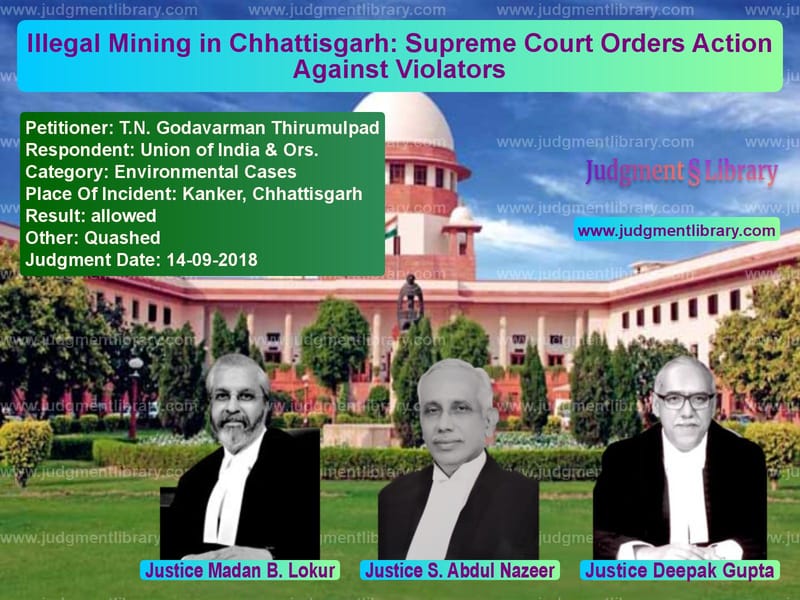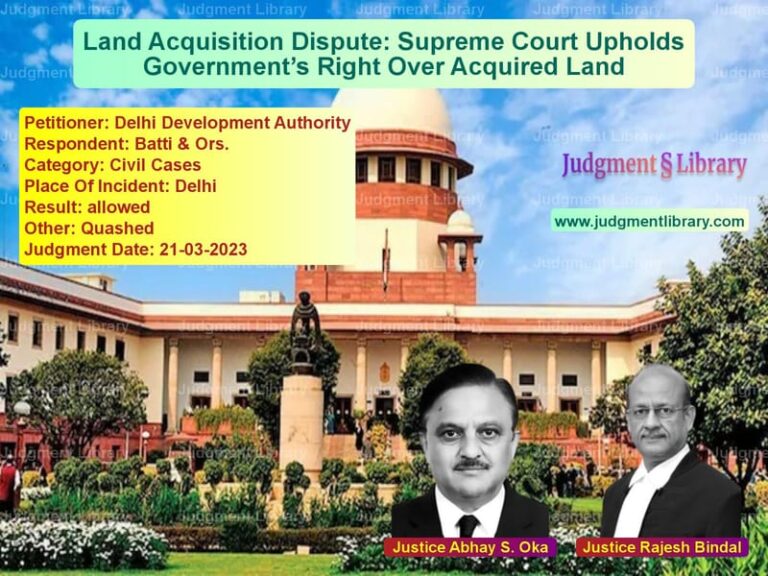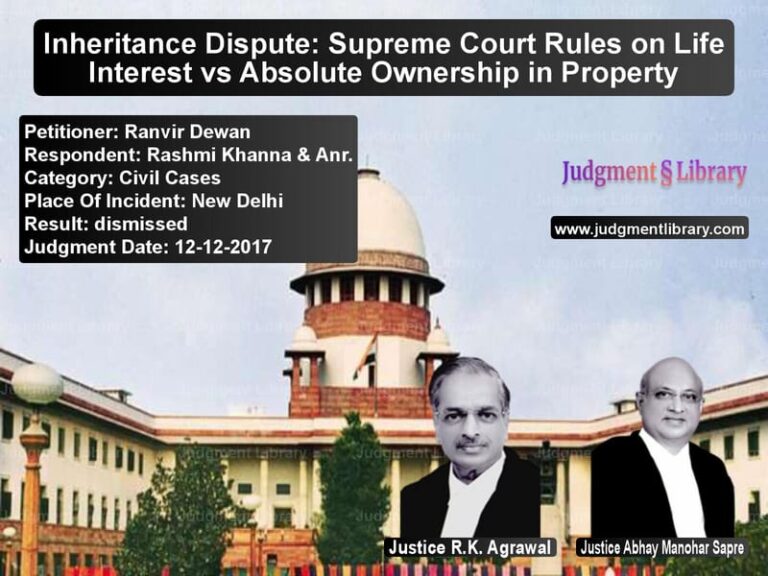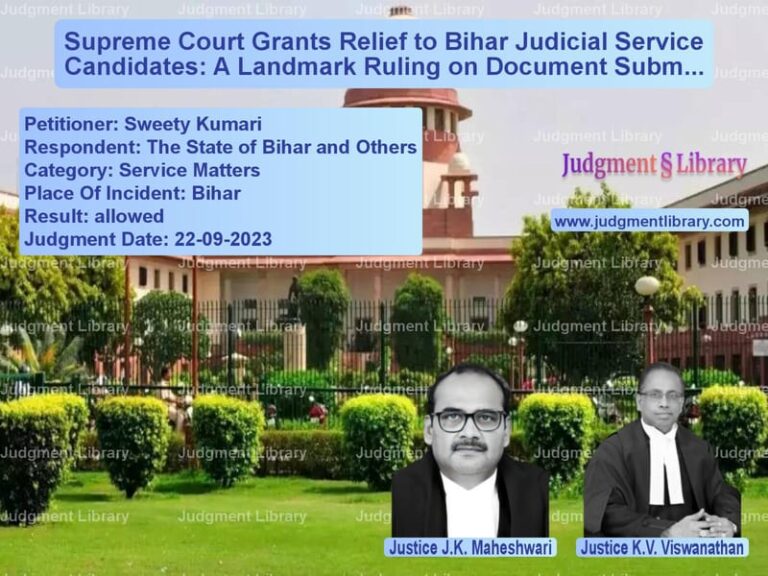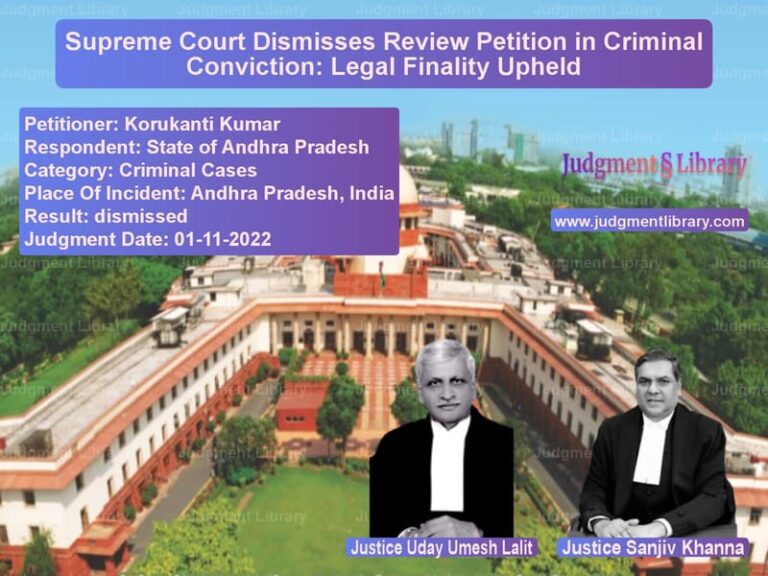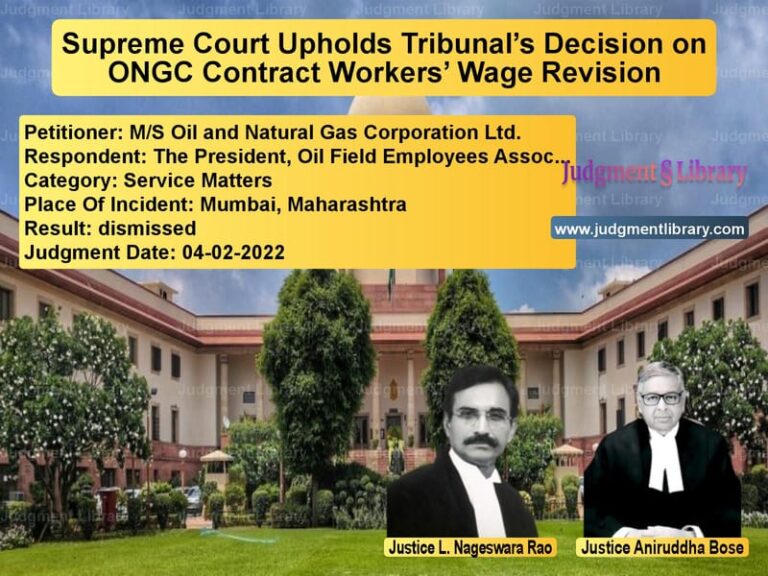Illegal Mining in Chhattisgarh: Supreme Court Orders Action Against Violators
The Supreme Court of India, in the case of T.N. Godavarman Thirumulpad vs. Union of India & Ors., addressed a significant issue of illegal mining activities in the state of Chhattisgarh. The case involved allegations that private individuals, with the support of government officials, were conducting mining operations in forest areas in blatant violation of the Forest Conservation Act, 1980. The Court ruled that mining leases granted in violation of forest laws were illegal and must be revoked.
The judgment serves as a landmark decision reinforcing the importance of environmental protection and the need for government accountability in preventing the unauthorized exploitation of natural resources.
Background of the Case
The case arose from an application filed by Bhupesh Baghel, MLA, before the Supreme Court in Writ Petition (Civil) No. 202 of 1995. The petition sought multiple reliefs, including:
- Stopping non-forest activities (including mining) in forest areas.
- Criminal prosecution of those responsible for violating environmental laws.
- Ordering a CBI investigation into forest land misuse.
- Recovery of compensation for environmental damage caused by illegal mining.
- Implementation of forest rehabilitation measures.
The allegations were primarily directed against Anil Lunia, an industrialist, who was accused of operating an iron ore mine in Kanker district, Chhattisgarh, in complete violation of forest laws.
Illegal Mining Operations in Chhattisgarh
The case detailed how Anil Lunia applied for a prospecting license for iron ore mining in Bhainsakanhar, District Kanker, on 31 October 1998. The license was granted by the Mining Department of Chhattisgarh on 25 January 2002, followed by a formal mining lease executed on 26 May 2003.
The lease conditions required the lessee to:
- Not cut trees without permission.
- Not enter reserved forests without prior approval.
- Follow the approved mining plan.
However, investigations revealed that:
- Lunia started mining operations without adhering to the approved mining plan.
- Thousands of trees were cut without permission.
- False revenue records were used to show forest land as non-forest land for lease approval.
Findings of the Central Empowered Committee (CEC)
The Supreme Court-appointed Central Empowered Committee (CEC) investigated the allegations and submitted a report confirming massive violations. The key findings included:
- The prospecting license was issued despite Lunia’s prior involvement in illicit tree felling.
- Iron ore mines in Bastar district were reserved for public sector companies, yet the lease was granted to a private individual.
- Mining was conducted without environmental clearance, violating the Environmental Protection Act, 1986.
- Annual production limits were exceeded multiple times:
| Year | Permitted Production | Actual Production |
|---|---|---|
| 2003-2004 | 6,000 MT | 69,000 MT |
| 2004-2005 | 6,000 MT | 35,400 MT |
| 2005-2006 | 6,000 MT | 18,281 MT |
Supreme Court’s Observations
The Supreme Court made scathing remarks regarding the role of state officials and observed:
- “The mining lease was granted in blatant violation of statutory requirements.”
- “The authorities failed in their duty to prevent large-scale deforestation.”
- “The illegal mining operations caused massive environmental damage, which must be remedied.”
Final Judgment
The Supreme Court issued the following directives:
- Recovery of full sale proceeds of illegally mined iron ore from Lunia.
- Blacklisting of Lunia from engaging in future mining operations for at least 10 years.
- Disciplinary action against government officials who facilitated the violations.
- Auction of confiscated iron ore to generate revenue for forest restoration.
- Afforestation programs to rehabilitate the degraded land.
Impact of the Judgment
This ruling sets a strong precedent in the area of environmental protection and accountability:
- Mining leases in forest areas must undergo strict scrutiny before approval.
- Government officials will be held personally accountable for permitting illegal activities.
- Forest rehabilitation measures must be implemented to compensate for environmental loss.
- Illegal operators will face blacklisting and financial penalties.
By upholding stringent environmental protection laws, the Supreme Court ensured that natural resources are not exploited at the cost of ecological balance.
Petitioner Name: T.N. Godavarman Thirumulpad.Respondent Name: Union of India & Ors..Judgment By: Justice Madan B. Lokur, Justice S. Abdul Nazeer, Justice Deepak Gupta.Place Of Incident: Kanker, Chhattisgarh.Judgment Date: 14-09-2018.
Don’t miss out on the full details! Download the complete judgment in PDF format below and gain valuable insights instantly!
Download Judgment: T.N. Godavarman Thir vs Union of India & Ors Supreme Court of India Judgment Dated 14-09-2018.pdf
Direct Downlaod Judgment: Direct downlaod this Judgment
See all petitions in Public Interest Litigation
See all petitions in Legislative Powers
See all petitions in Environmental Cases
See all petitions in Judgment by Madan B. Lokur
See all petitions in Judgment by S. Abdul Nazeer
See all petitions in Judgment by Deepak Gupta
See all petitions in allowed
See all petitions in Quashed
See all petitions in supreme court of India judgments September 2018
See all petitions in 2018 judgments
See all posts in Environmental Cases Category
See all allowed petitions in Environmental Cases Category
See all Dismissed petitions in Environmental Cases Category
See all partially allowed petitions in Environmental Cases Category

